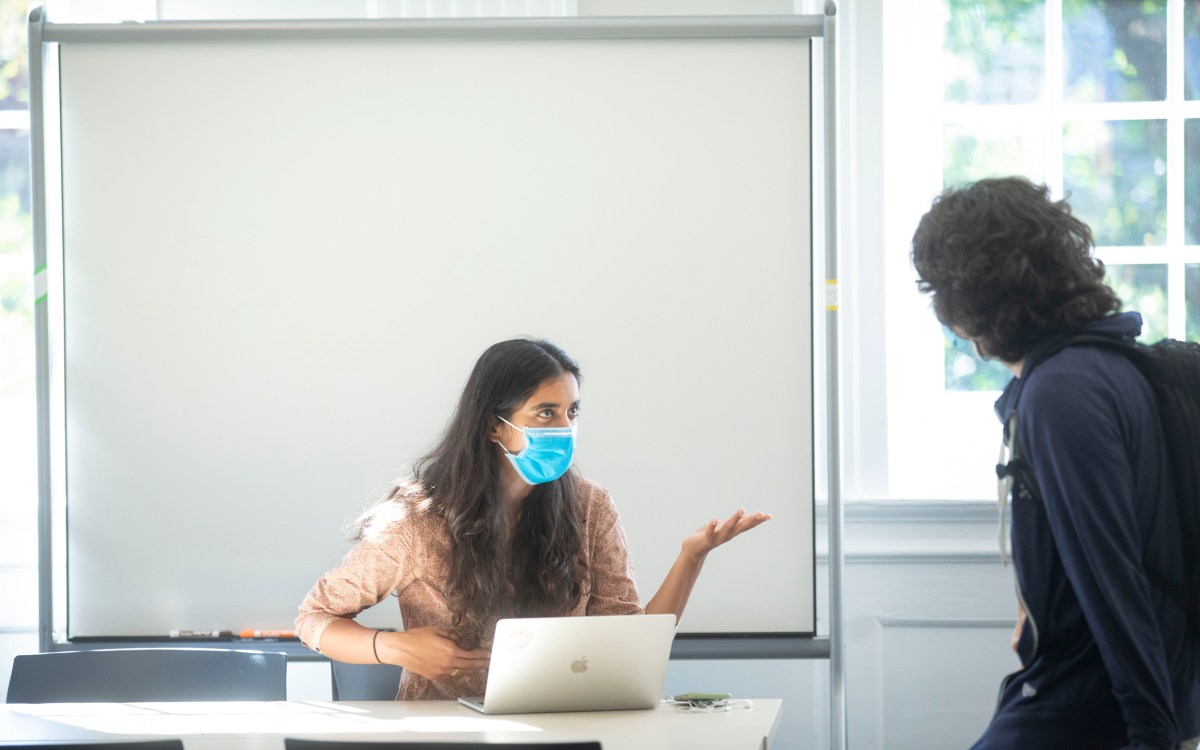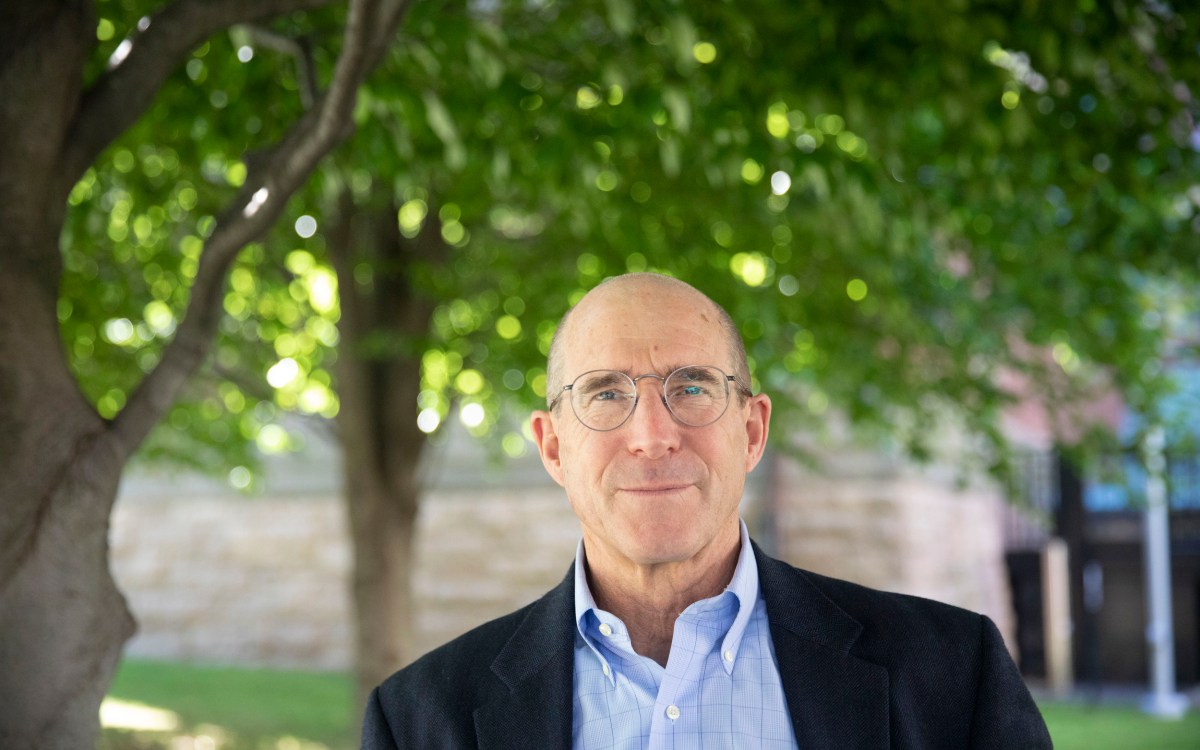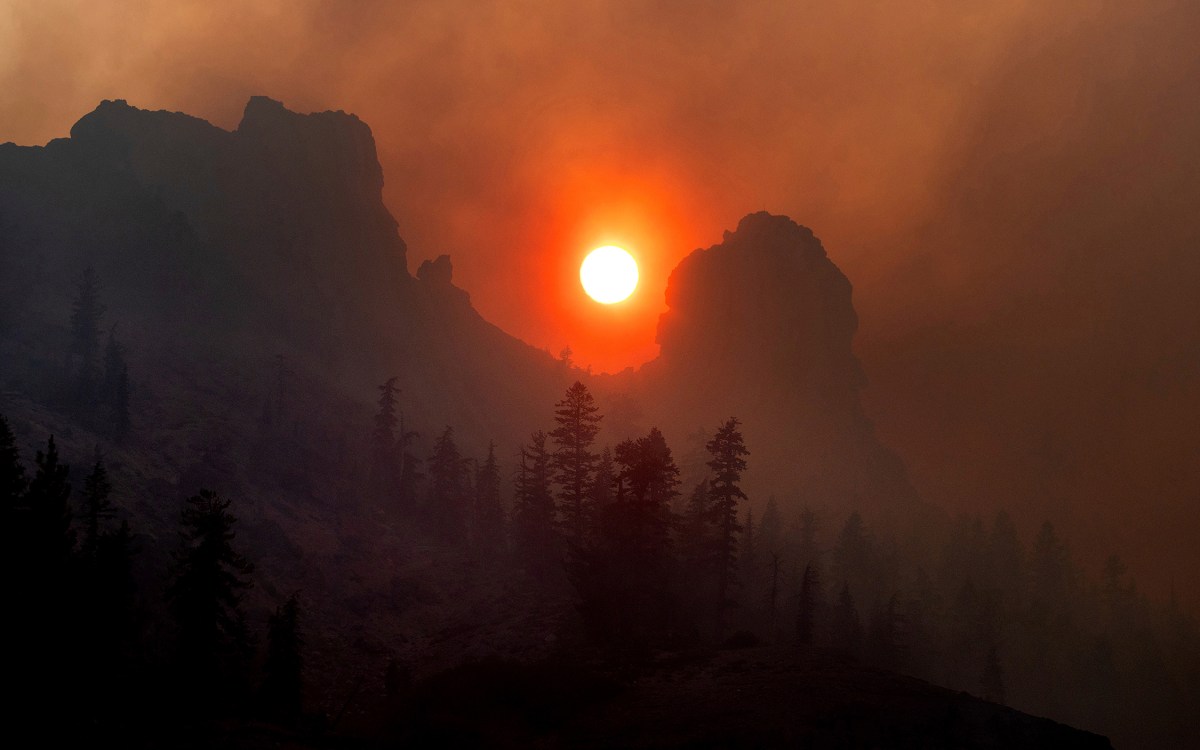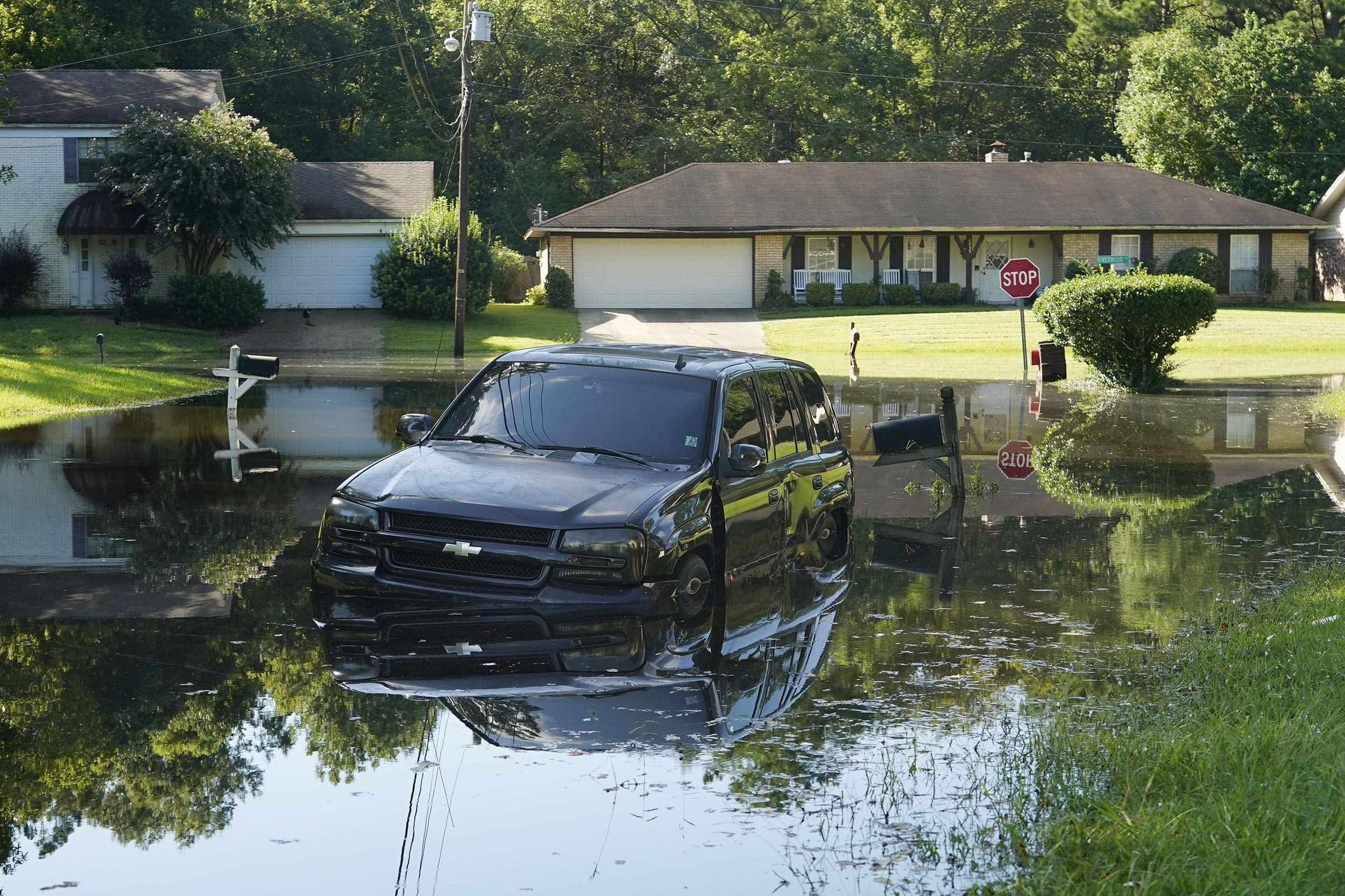
Flooding has devastated Jackson, Miss., in recent weeks. “These crises are complex,” says Ian Miller, a Harvard historian and a member of the Committee on Climate Education. “They’re difficult to understand and trace to a single origin, but they are — I think we all can agree on this point, finally, belatedly — linked to one degree or another to global climate change.”
AP Photo/Rogelio V. Solis
Grappling with climate change through deeper learning, real-world action
New report suggests increases in faculty, resources, courses across University, and internship, fellowship opportunities
A new report examining how Harvard teaches climate change urges an all-hands-on-deck approach, promising not only more but also deeper instruction in disciplines that span the University at a moment of heightened concern about a changing world.
“Climate change is not simply climate change anymore. It is ‘everything change,’” said Ian Miller, history professor, Cabot House faculty dean, and a member of the Committee on Climate Education, which wrote the report. “This summer has been a summer of suffering globally.”
Miller and other committee members said extreme weather events bearing climate change’s fingerprints were rife. Europe just experienced its hottest summer on record, while the U.S. had its third-hottest summer, according to a recent NOAA report, complete with three 1,000-year flood events, in Dallas, Death Valley — which set an all-time 24-hour rain record — and southern Illinois, where one community recorded 14 inches of rain in just 12 hours. Historic floods struck Kentucky and Pakistan, while drinking water shortages threaten South Africa and Jackson, Mississippi, the former fueled by drought, the latter by flood.
“The Mississippi capital — the capital of an American state — is without potable water,” Miller said. “These crises are complex. They’re difficult to understand and trace to a single origin, but they are — I think we all can agree on this point, finally, belatedly — linked to one degree or another to global climate change.”
The report was commissioned by Vice Provost for Climate and Sustainability James Stock and outlines a new push to expand education in climate change that draws resources and expertise from across the Harvard community, including faculty, staff, alumni, and peer teaching among students. It offers a series of concrete steps, including hiring additional faculty, creating a new standing committee to oversee implementation and an outside advisory panel, and establishing a climate education accelerator to foster needed changes. The report envisions new courses in every discipline, increased internship and fellowship opportunities, assistance for faculty in fields not traditionally linked to climate who want to incorporate it in classes, and additional resources for all of the above.
“It’s not just ‘more.’ It’s ‘more’ and more focused. More focused and more intentional and more visible,” said Erin Driver-Linn, dean for education at the Harvard T.H. Chan School of Public Health and a committee member. “It’s ‘Let’s make this a priority,’ and, by Harvard making this a priority, have an impact through education and the ripple effects of what our students and faculty are doing out in the world. This will matter a lot to our global public health community.”
“It was clear from talking with students, talking with administrators, and looking at course offerings that although we were creating more courses, we weren’t really keeping up with demand,” said Vice Provost for Climate and Sustainability James Stock.
File photo by Kris Snibbe/Harvard Staff Photographer
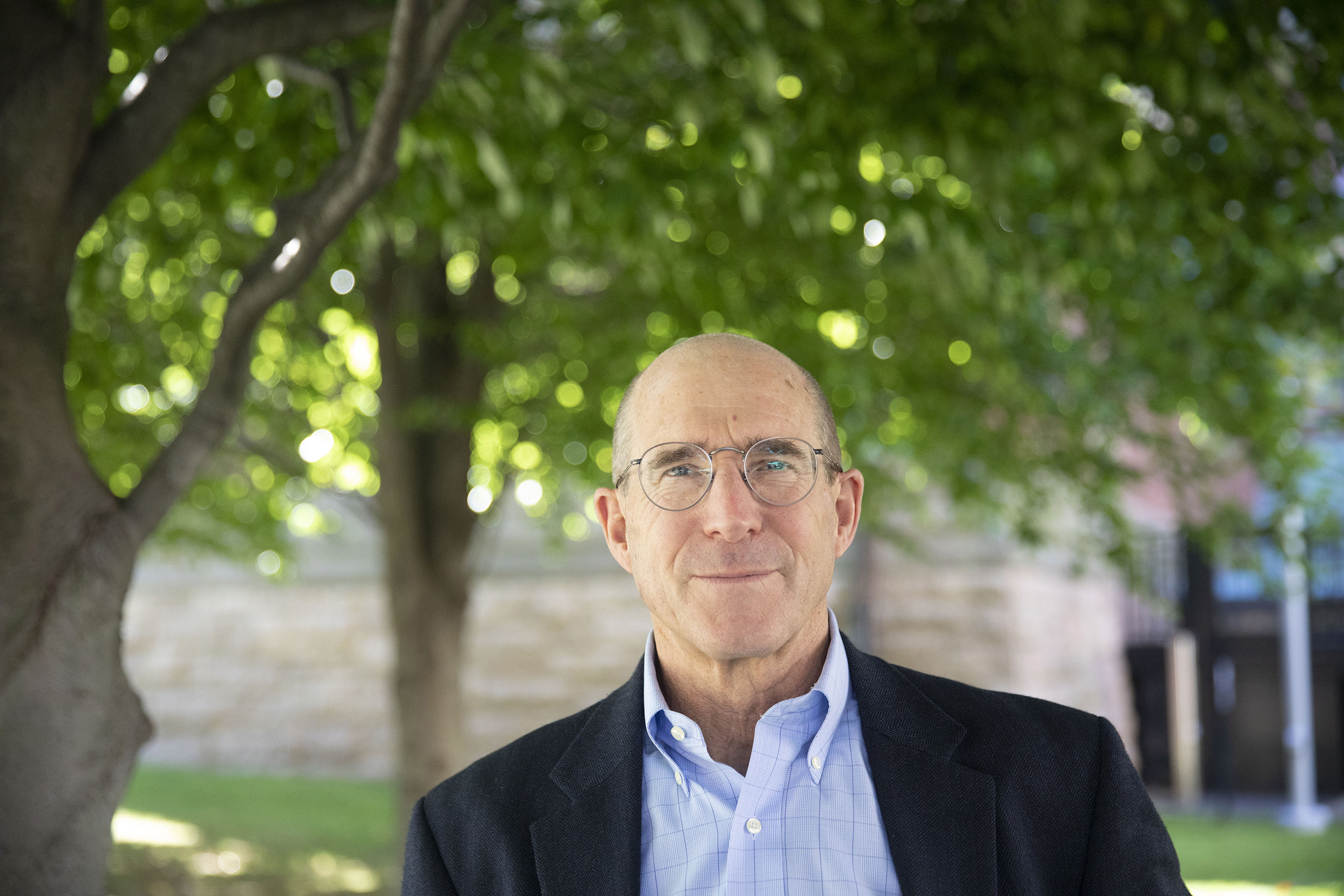
The report was commissioned in January and produced by a 30-person team of faculty and administrators. Stock said Harvard has steadily ramped up teaching in this area over the years, and the Harvard University Center for the Environment has supported student programs across the University. But he still heard from students that more is needed — more opportunities to learn, conduct research, and engage with the problem through internships and fellowships.
“The importance of preparing students — and students wanting to be prepared — for the changing climate has become much more salient in the last several years,” Stock said. “It was clear from talking with students, talking with administrators, and looking at course offerings that although we were creating more courses, we weren’t really keeping up with demand. And because climate change cuts across all our Schools, a cross-School perspective is in order. It seemed like there were lots of opportunities.”
Stock said that another relatively recent change has been in the job market. Jobs for what he broadly termed “climate professionals” used to be limited to nonprofits, higher education, and government. Now, he said, many corporations and private companies have sustainability offices and are paying much closer attention to environmental impacts of their products and operations.
“The world of what we might call broadly ‘climate professionals,’ especially at the level at which our students go out on the job market, is really exploding,” Stock said. “There are now opportunities for our students to pursue their passion for tackling climate change in a professional way. And that again asks us to take a closer look as to how we can prepare them for those opportunities.”
Led by co-chairs Dustin Tingley, professor of government and deputy vice provost for advances in learning, and Noel Michele Holbrook, Harvard Forest director and the Charles Bullard Professor of Forestry, the committee wasted little time, breaking into subcommittees that surveyed and gathered comments from Harvard’s Schools before regrouping to synthesize what they found into the report.
Tingley praised those who participated in the effort, saying it was a cross-School, whole-University process. He said the committee took pains to reach out to departments and programs that might not seem obvious participants in a climate-change education effort, such as the Harvard Writing Center and the Athletic Department. Tingley said the recommendations seek to meet each student where they are by providing numerous avenues to engage with the topic, connecting learners to the world by partnering with alumni and outside organizations and touching on all of campus life, from the Houses to clubs, labs, and elsewhere.
“If there’s one overall theme, it’s the astounding opportunity afforded us because of buy-in across the board,” Tingley said. “Harvard sits within a network of unparalleled alumni, companies, governments, and NGOs that want to work with our students.”
“We should recognize and resist the risk of addressing the complexity of climate change by incorporating it in shallow ways, leading to students who end up engaging in superficial advocacy rather than in the essential, but harder, intellectual and creative work of developing solutions to the complicated challenges, and assessing the difficult tradeoffs.”
Holbrook said one thing that pleased her as she listened was that no convincing was needed, because every corner of the University already thought this issue was relevant to them and their students. An important step, she said, will be building bridges between the professional Schools and the College so students can envision a career path, such as understanding the work of an environmental lawyer or how things might impact the bottom line for a business leader. Students, Holbrook and Miller said, are eager to tackle the problem but also anxious about the future in a world likely to warm significantly from today.
“We need to equip our students with a rigorous understanding of the challenges posed by climate change without letting them become overwhelmed,” Holbrook said. “One measure of the success of climate education at Harvard will be an increase in the number of students committed to developing and promoting durable, effective, and equitable climate solutions.”
Suzanne Cooper, the Harvard Kennedy School’s academic dean for teaching and curriculum and a member of the committee, said the recommendations taken together are larger than the sum of their parts, in that they don’t seek to tell faculties or departments what courses to add but instead set a strategy that they hope will foster their creation, cooperation across disciplinary and School boundaries, innovation, and engagement with the world outside campus. Some students experience that interdisciplinarity today, she said, but often they have to find opportunities themselves, something she hopes will become easier in the future.
Stock, who thanked the committee for its work, said he looks forward to bringing its recommendations to life.
“The committee did a great job producing a thoughtful report in a short period of time, and I’m grateful for their efforts. I’m especially grateful for co-chairs Missy Holbrook and Dustin Tingley for their leadership,” Stock said. “The report makes many thoughtful recommendations, and I look forward to working with the Schools to act on them.”
In the end, the authors wrote, the recommendations seek to leverage Harvard’s strengths — its talented faculty and students, academic breadth, and engaged broader community — to address an enormously complex, global problem head-on, which means there inevitably will be “difficult tradeoffs” and “complicated solutions.”
“[W]e should recognize and resist the risk of addressing the complexity of climate change by incorporating it in shallow ways,” the report concluded, “leading to students who end up engaging in superficial advocacy rather than in the essential, but harder, intellectual and creative work of developing solutions to the complicated challenges, and assessing the difficult tradeoffs.”



